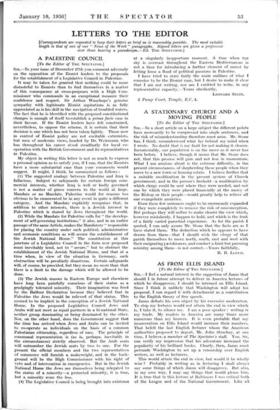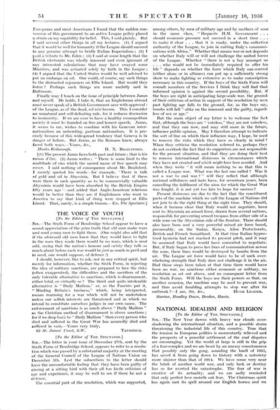AS FROM ELLIS ISLAND
[To the Editor of THE SPECTATOR.]
SIR,—I feel a natural interest in the suggestion of Janus that should I in future attempt to deliver in America lectures of which he disapproves, I should be interned on Ellis Island. Since I think it unlikely that Washington will adopt his proposal, I can regard it with detachment as a contribution to the English theory of free speech.
Janus defeats his own object by his excessive moderation. To stop my lectures would not attain the end in view which is, I take it, to silence me. I am a poor speaker : writing is my trade. My readers in America are many times more numerous than my hearers. It is even probable that my incarceration on Ellis Island would increase their numbers. That befell the last English lecturer whom the American authorities proposed to deport, Mr. John Strachey, at one time, I believe, a member of The Spectator's staff. You, Sir, can verify my impression that his adventure increased the popularity of his brilliant books. Clearly, then, Janus must persuade Washington to set up a censorship over English writers, as well as lecturers.
This would attain the end in view, but would it be wholly wise ? Probably in writing as in lecturing I shall always say some things of which Janus will disapprove. But also, in my own way, I may say things that would please him. It is true that in this lecture at Baltimore I was critical both of the League and of the National Government. Like all Europeans and most Americans I found that the sudden con- version of this government to an active League policy placed a strain on my capability for belief. This, I said plainly. But I said several other things in all my lectures. (1) I argued that it would be well for humanity if the League should succeed in any genuine attempt to bridle Italian Imperialism ; (2) I paid a tribute to Mr. Eden ; (3) I said at some length that the British electorate was wholly innocent and even ignorant of any interested calculations that may have swayed some Ministers, and was actuated solely by faith in the League ; (4) I argued that the United States would be well advised to put an embargo on oil. One could, of course, say such things to the distracted sojourners on Ellis Island. But would they listen ? Perhaps such things are more usefully said in Baltimore.
Finally may I touch on the issue of principle between Janus and myself. He holds, I take it, that an Englishman abroad must never speak of a British Government save with approval : of the League, as of the dead, nil nisi bonum. This I consider an unnatural and self-defeating rule, for it reduces discussion to insincerity. If we are ever to have a healthy cosmopolitan society it must 133 founded on free and honest speech. Janus, it seems to me, wishes to combine with his Genevan inter- nationalism an unbending, partisan nationalism. It is pre- cisely because of this widespread tendency that Geneva is in danger of failure. But Janus, as the Romans knew, always faced both ways.—Yours, &c., Monks Risborough. II. N. BRAILSFORD.
[(1) The present Janus faces both past and future ; that is his raison d'elre. (2) Janus writes : " There is some limit to the multitude of sins which the sacred name of free speech may cover. I said nothing of consequence about Mr. Brailsford. I merely quoted his words—for example, There is talk of gold and oil in Abyssinia. But I believe that if these were there in such quantity as to be commercially valuable Abyssinia would have been absorbed by the British Empire fifty years ago '—and added that Anglo American relations would be better than they are if Englishmen who went to America to say that kind of thing were stopped at Ellis Island. That, surely, is a simple truism.—En. The Speclator.1











































 Previous page
Previous page